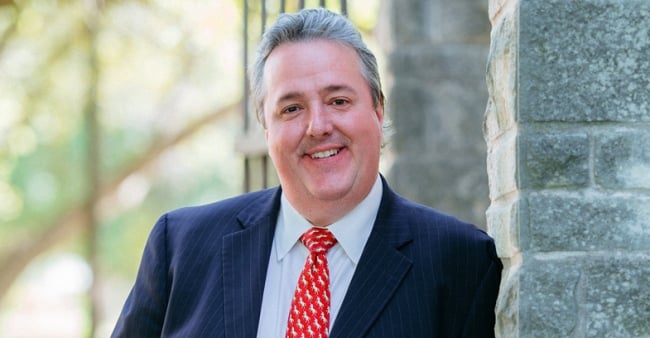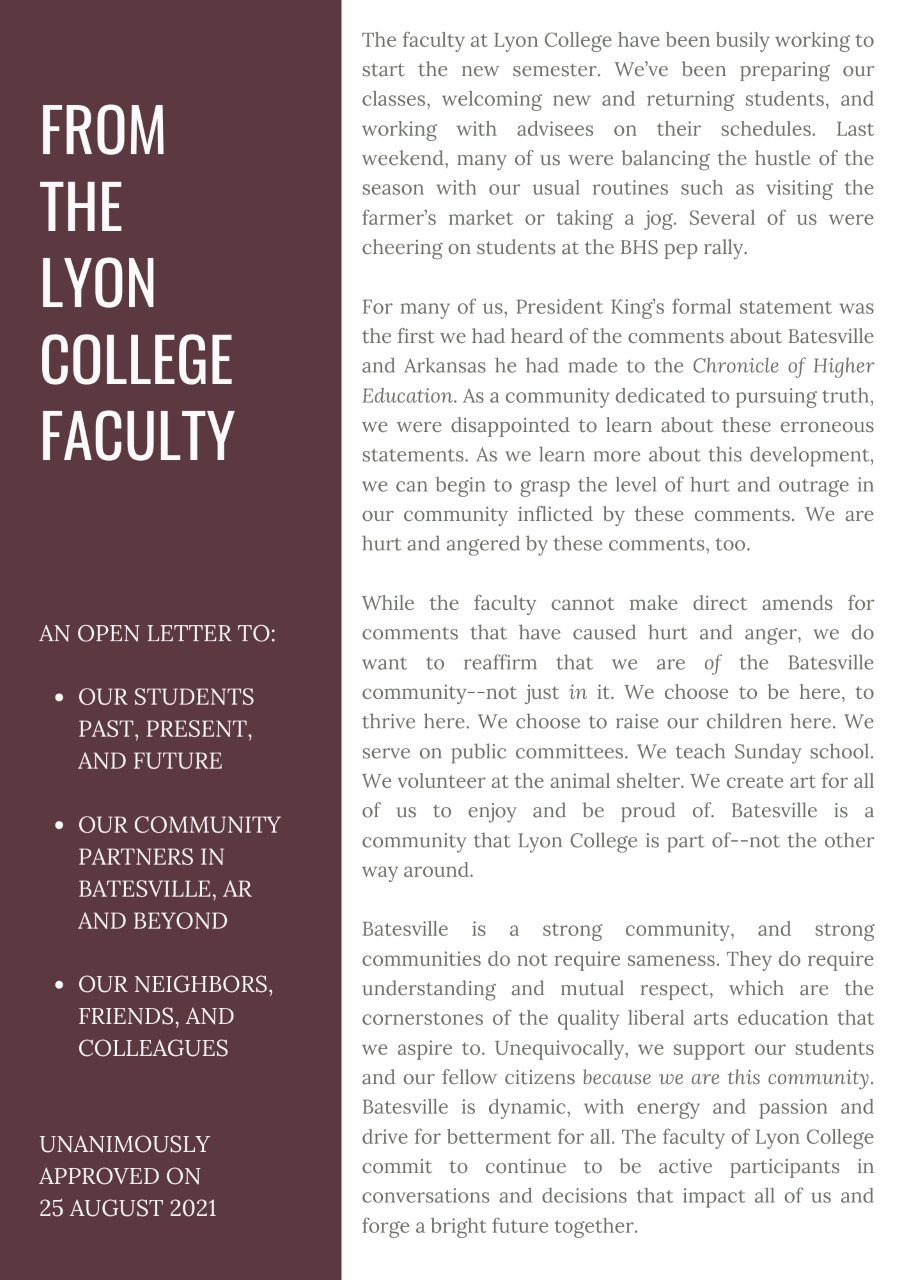You have /5 articles left.
Sign up for a free account or log in.

W. Joseph King
Lyon College
The president of Lyon College in Batesville, Ark., resigned last week following outrage over an interview he gave to The Chronicle of Higher Education in which he discussed white supremacist activity in the area surrounding the college town.
W. Joseph King characterized Lyon, a private liberal arts institution, and another college in Virginia where he formerly worked as “bubbles of inclusion and of diversity surrounded by a sea of angry, disenfranchised populations and a large white-supremacist population,” according to the July 26 Chronicle article. “Both colleges have had to deal with active Klan chapters in the area.”
King is also is quoted saying that his home was vandalized with a spray-painted expletive following a meeting with students in which he told them to expect to find their political beliefs challenged. He also said that the Lyon campus had to go into effective lockdown after pro-Trump rallies in Arkansas during the fall of 2020 brought crowds bearing Confederate flags and neo-Nazi symbols.
The article originally said King suggested that the Trump rally happened in Batesville, a fact disputed by the Batesville police chief, who told a local broadcaster the rally and the alleged vandalism at King’s house never happened.
King said in an Aug. 21 statement that the Chronicle article, which had been published nearly a month earlier, had misquoted him as saying the rally was in Batesville, and that he was working with the article’s author on a correction. The Chronicle issued a correction Aug. 24 updating the record but denying any misquote: "A description by Lyon College’s President Joey King of fall-2020 campaign gatherings in support of Donald Trump refers to events elsewhere in Arkansas, not in Batesville, as King erroneously said earlier," the correction reads.
The Chronicle reported Friday that the article’s author had contacted King in May to fact-check the account and that King wrote to the article’s author last week to say he’d erred in not flagging the incorrect information during the fact-checking process.
“I did it on my phone, and I missed the part about the Trump rally,” King wrote. “We were afraid that that was going to happen in Batesville and had prepared as I discussed. However, it ended up happening in another town in the Ozarks.”
King said in his Aug. 21 statement that he valued his relationship with the community and drew a distinction between Batesville, a town of about 10,000 people located in the foothills of the Ozark Mountains, and other parts of Arkansas. The Southern Poverty Law Center, a nonprofit organization that tracks the activities of hate groups, identified 14 hate groups that were active in Arkansas in 2020.
“While Lyon and the surrounding Batesville community might be welcoming and inclusive, we cannot pretend to expect the same in all areas of the state,” King wrote in the statement, which was issued five days before the announcement of his resignation.
"We value our relationship with the community that we have called home for almost 150 years," he wrote. "Moreover, we will continue to strengthen that relationship, but we will also continue to support and listen to our students from marginalized communities. The safety and welfare of our campus community is always our utmost priority."
The chairman of Lyon’s Board of Trustees, Perry L. Wilson, did not give a reason for King’s resignation, announcing only that the board had accepted it and thanking King for his service to the college.
"The College has established numerous programs and initiatives that have flourished under his leadership including the College’s ROTC program and military science concentration," Wilson wrote. Wilson also credited King with paving the way for discussions around a potential "strategic partnership" with another Arkansas institution, the University of the Ozarks.
Lyon’s provost, Melissa Taverner, was named interim president of the college, which enrolls about 660 students.
Civic and community leaders had been at the forefront in calling for King's resignation.
The mayor of Batesville, Rick Elumbaugh, joined with Independence County Court Judge Robert Griffin and Crystal Johnson, CEO of the Batesville Area Chamber of Commerce, in sending an open letter to Lyon’s board calling for King’s termination over his comments in the Chronicle.
“Dr. King’s inaccurate portrayal of the community and later comments about the State of Arkansas have resulted in overwhelming disdain for his role as a leader in this community and shattered confidence in his ability to represent and lead Lyon College,” they wrote in the letter, which was published by KAIT8, an ABC affiliate.
Elumbaugh said he’d received an “an outpouring from the community from students to faculty to just our citizens that were just very upset with the comments that had been made.”
“I was receiving phone calls from other communities as well, saying, my gosh, that’s not Batesville,” Elumbaugh said in an interview. “I’ve never known Batesville to be deemed as a community that diversity was not welcomed in.”
Elumbaugh said King’s effort to shift the focus of his comments from Batesville to other areas in the state was not appreciated.
"Arkansas is a small state, and we take great pride in our communities," he said. "We do not see that this is being a problem even across our state."
Elumbaugh added that King had not cultivated good relations with the community.
“I think it could have been a better working relationship with the community,” he said. “There weren’t any ill feelings between he and I. I just feel our complete community kind of had a disconnect with him. He wasn’t as personable as our past presidents have been over the years.”
 The Lyon College faculty also unanimously approved a statement (at left) expressing disappointment, hurt and anger in King’s "erroneous statements."
The Lyon College faculty also unanimously approved a statement (at left) expressing disappointment, hurt and anger in King’s "erroneous statements."
"While the faculty cannot make direct amends for comments that have caused hurt and anger, we do want to reaffirm that we are of the Batesville community -- not just in it," the statement said.
King, who is also founder and principal of Academic Innovators, a higher education consultancy, did not respond to email messages seeking comment Friday.
He is well-known in higher education circles and is co-author of the book How to Run a College (Johns Hopkins Press 2018) and former executive director of the National Institute for Technology in Liberal Education. He also led Rice University’s Connexions, an open education initiative.
Before beginning his presidency at Lyon in 2017, he served as senior adviser to the president of Emory & Henry College in Virginia.
Greg Britton, editorial director for Johns Hopkins Press, said on Twitter that King is "one of the most thoughtful, progressive, innovative leaders in #HigherEd these days. This is an enormous loss for a college like @LyonCollege."
Britton, who published a book co-authored by King and is publishing another one in January, said he thinks more is likely happening behind the scenes, and he suspects King’s role in pushing the college to reckon with financial challenges through a merger or partnership might have rankled some individuals.
“Comments like that are not something to get someone fired unless somebody’s out to get you,” Britton said in an interview. “No one wants to think of their community as harboring white supremacist attitudes, but all our communities do -- that’s what we’ve learned in 2020-21. I thought it was courageous of him to say this is what colleges stand against.”
King was quoted in the Chronicle article calling for the need for college leaders to take on political issues.
“Presidents are going to have to take hard positions,” he is quoted as saying. “It’s going to get them on the wrong side of their trustees and donors sometimes, and their political leaders.”

.jpg?itok=YusUVfky)






